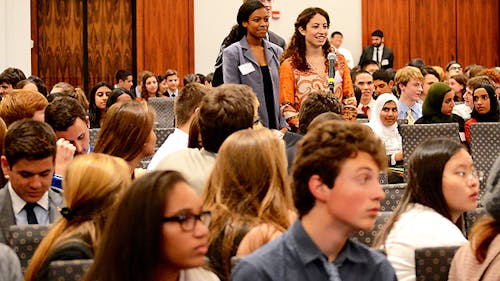Students hold national Model UN conference

The Hyatt Regency hotel in downtown New Brunswick was filled with 1,200 high school students on Thursday night, which marked the start of the 2013 Rutgers Model United Nations Conference.
Students as nearby as New Jersey and Delaware, and as far away as Florida and Mexico City, gathered to spend four days debating, participating in workshops and learning about the United Nations.
Sabrina Arias, the secretary-general of RUMUN, said the Rutgers conference was different from other Model U.N. conferences because the entire weekend had a theme that dictated the issues students debated.
“Our theme this year is sustainable development — how to solve the world’s problems today in a way that will have an impact tomorrow and will do good things today and tomorrow,” said Arias, a School of Arts and Sciences senior.
Karen Johnson, who spent her career working for U.S. Department of State and has worked on sustainable development issues in the past, was the keynote speaker at the opening ceremony of RUMUN 2013.
“I hope that your biggest takeaway will be the insight that regardless of where you call home, what religious beliefs, if any, you hold, what language you speak, that we humans are, in fact, all the same when it comes down to what’s really important,” Johnson said.
The Texas native said she was afraid to go to New York for the first time because she thought it was going to be so different. In the end, Johnson said she learned that New Yorkers were really no different than Texans.
She went on to talk about her summer in Europe and her time in South Korea, where she thought the people she would encounter would be significantly different. Both times, she was proven wrong.
“I was certainly chagrin that it took me 30-plus years to realize that people are people all around the globe,” she said.
On the inside, all people wish for peace and well-being for their families and for society, she said. They want dignity, respect and hope for the future.
“I urge you to learn from my experience, embrace this truth and incorporate this concept as a guiding principle in your work at this conference as you represent countries of our world community,” she said.
When most people think about sustainable development, Arias said they think it is only about how to be greener and eco-friendly, but it also includes social and political components.
“It’s going to challenge them to bring those different elements together,” she said.
Arias said the conference gave students four days to tackle issues that world leaders have been facing for years.
“How is it that these 15-year-old kids can solve these problems, but the people of the real U.N. can’t?” she said.
For many of the students, Arias said this was their first professional experience, and they got the opportunity to learn about public speaking and how to work with people they disagree with.
Arias started participating in RUMUN as a high school student, she said. Her goal as a staff member is to recreate the experiences she had. She aims to help students overcome their fear of public speaking and help them learn more about maternal health care.
The students spent most of their time debating in committees of 15 to 115 students, Arias said. They were assigned specific topics and they came prepared with their positions.
In between debates, Arias said students attended workshops led by officials from the U.N., Rutgers professors and Rutgers students. The workshops covered an array of topics, from how to get a job at the U.N. to what negotiating at the U.N. is like.
“It’s not just debating,” she said. “We add a lot of extra experiences to really make it engaging and have a lot of different levels that students can engage with.”
Students debated everything from environmental issues like sustainable use of forest resources, to how to empower rural women, to how to bridge the gap between developed and developing nations, Arias said.
Arias was most excited to see how creative the students could be, she said. She loved reading over their resolutions to see what sort of out-of-the-box ideas they came up with to solve the issues.
Brandon Smith, RUMUN’s director of administration, said he worked toward coming up with creative ways to establish the theme within the conference, such as videos, 3-D graphs and posters.
“For me, a successful conference is a conference where every student is involved, engaged and able to participate,” said Smith, a School of Arts and Sciences junior. “They should walk away with not only an understanding of their topic, but the motivation to see something done about it.”
Smith said he had established the best video and audio representations of sustainability — the theme of the conference to provide the best educational environment for students.
Vyshakh Kodoth, director of staff for RUMUN, said the staff is made up of 60 undergraduate students who worked for the conference for the past year.
Kodoth, a School of Arts and Sciences junior, said a part of his job was to make sure the staff is well-versed in sustainable development so they could translate it into effective teaching methods for the students.
Twenty student directors took a three-credit class during the spring semester, where they had to put in hours of time outside the classroom to publish their own papers on an assigned topic, he said.
Kodoth said he was proud of his staff because they worked collaboratively to put this conference together.
“I’ve learned a lot from them and hopefully they’ve learned a lot from me,” he said.



